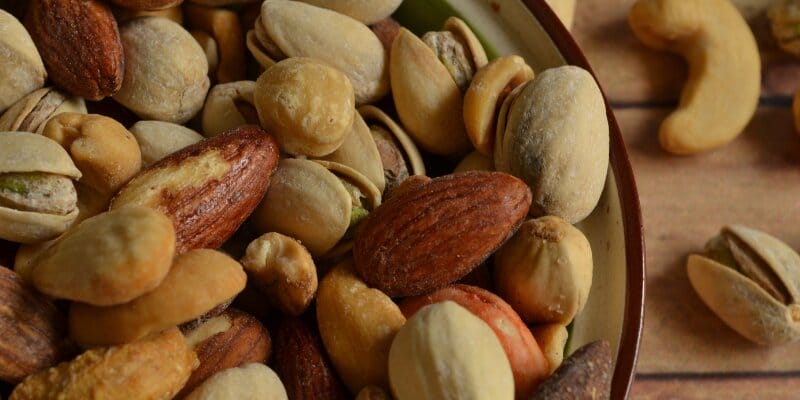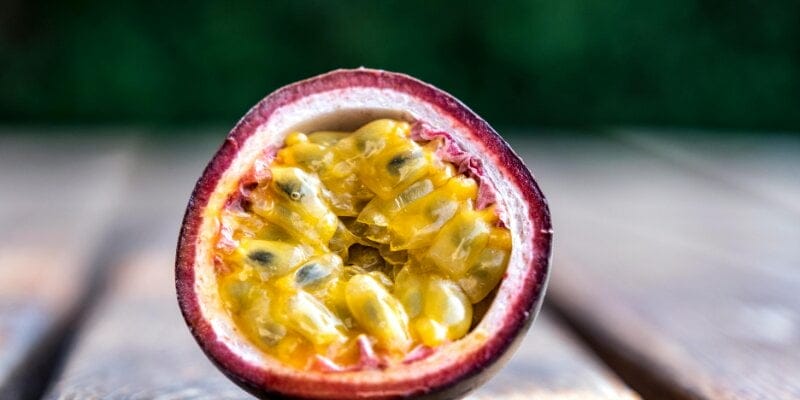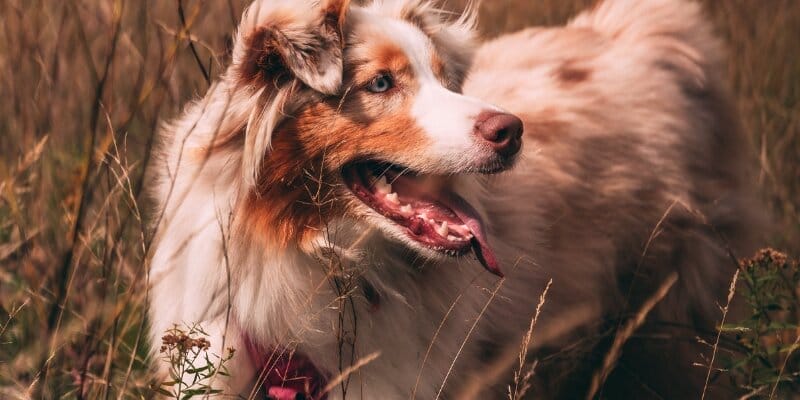How Much to Feed a Basset Hound Puppy
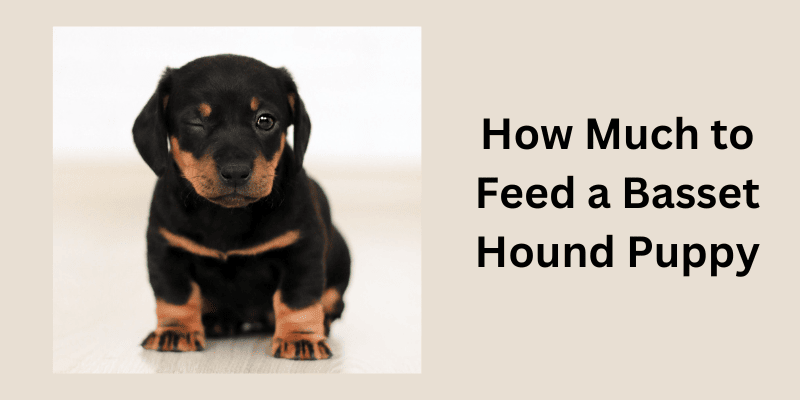
INTRODUCTION “How much to feed a basset hound puppy”
If there’s one thing that brings an instant smile to my face, it’s the delightful and endearing presence of a Basset Hound puppy. Those droopy eyes, floppy ears, and the undeniable charm they exude make them a beloved addition to any family.
How much to feed a basset hound puppy is a crucial responsibility. As a proud owner, understanding their dietary needs becomes paramount to ensure their growth, health, and overall well-being.
Understanding a Basset Hound Puppy’s Nutritional Needs
Basset Hound puppies possess distinct dietary requirements owing to their growth rate, size, and metabolism. Providing them with a balanced diet promotes healthy development and guards against potential health issues.
Factors Influencing Feeding:
- Age: During their initial growth phase, Basset Hound puppies need a specialized diet rich in nutrients to support their development.
- Size: While Bassets aren’t the largest breed, they have specific needs due to their body structure and potential for weight gain.
- Activity Level: Tailoring their food intake to match their energy expenditure is vital to prevent obesity or nutritional deficiencies.
How Much to Feed a Basset Hound Puppy?
- Consultation with a Veterinarian:
Before diving into specific portions, it’s essential to consult a veterinarian. They’ll provide personalized guidance based on your puppy’s unique needs, considering factors like weight, health status, and growth rate. - Recommended Portion Sizes:
Typically, a Basset Hound puppy might require around 1 to 1.5 cups of high-quality puppy food, divided into 3 or 4 meals daily. However, these figures may vary based on factors like the food’s calorie content, the individual puppy’s metabolism, and any health conditions. - Monitoring and Adjustments:
Observing your puppy’s body condition, energy levels, and weight gain is crucial. Adjust the portion sizes accordingly to maintain a healthy growth rate and weight.
Tips for Feeding Your Basset Hound Puppy
High-Quality Food: Opt for puppy-specific, high-quality dog food rich in essential nutrients, proteins, and vitamins necessary for growth.
Scheduled Meals:
Establish a consistent feeding schedule to regulate their digestive system and prevent overeating.
Avoid Overfeeding:
Basset Hounds have a tendency to overeat, leading to weight-related issues. Ensure measured portions to maintain a healthy weight.
Hydration:
Always provide fresh water to keep your puppy hydrated, especially after meals and during physical activities.
Best Dog Food for Basset Hound Puppies
Selecting the right food for your Basset Hound puppy lays the foundation for their health and growth. High-quality puppy-specific food containing essential nutrients, protein, and vitamins is ideal. Look for brands with:
- Balanced Nutrition: Foods formulated specifically for puppies provide the necessary nutrients for their growth and development.
- Natural Ingredients: Opt for foods with real meat as the primary ingredient and avoid artificial preservatives or fillers.
- DHA for Brain Development: Certain puppy foods contain DHA (docosahexaenoic acid), aiding in cognitive development.
- Size-Specific Kibble: Basset Hounds have unique facial structures, so choosing kibble designed for their jaw shape can aid in chewing and digestion.
Do basset hounds have sensitive stomachs
Stomach Sensitivity in Basset Hounds
Basset Hounds can indeed have sensitive stomachs, prone to issues like food allergies, intolerances, or digestive problems. Some signs of stomach sensitivity include:
- Vomiting
- Diarrhea
- Excessive Gas
- Skin Irritations or Itching
- Lethargy or Discomfort after Eating
If you notice these symptoms, consult your vet to determine the cause. They might suggest dietary changes, such as switching to hypoallergenic or easily digestible food to alleviate sensitivity issues.
How Much Should Basset Hounds Eat a Day?
Determining the appropriate amount to feed your Basset Hound puppy depends on various factors:
- Age: Puppies require more frequent meals. Generally, they might need around 1 to 1.5 cups of food divided into 3 or 4 meals daily. Adjustments are made based on growth rate and energy expenditure.
- Weight: Ensure you’re feeding your puppy according to their weight to avoid over or underfeeding.
- Activity Level: Active Bassets may require more food compared to less active ones.
Monitoring your puppy’s body condition and adjusting portions accordingly is essential for maintaining their health and weight.
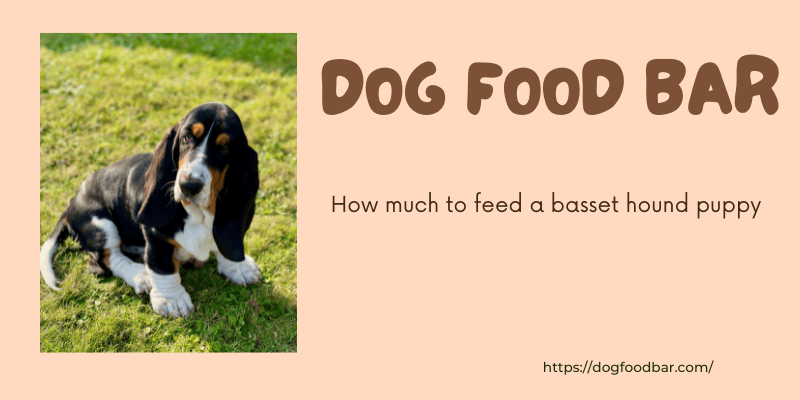
How long should a basset hound eat puppy food?
Basset Hounds usually reach adulthood between 12 to 18 months. Around this time, transitioning from puppy food to adult food becomes necessary. Make the switch gradually over a span of about a week or two to prevent stomach upset. Mix a portion of the new adult food with their existing puppy food, gradually increasing the proportion of adult food until it fully replaces the puppy food.
Taking care of a Basset Hound puppy involves understanding their unique dietary needs, potential stomach sensitivity, and the transition from puppy to adult food. By choosing the right food, monitoring their health, and seeking guidance from your vet, you ensure a healthy and thriving journey for your beloved Basset Hound pup.
Remember, each Basset Hound is an individual, so paying attention to their specific needs and preferences is key to their well-being.
Basset Hound Puppy Food Chart:
| Age (Months) | Daily Meals | Meal Frequency | Portion Size per Meal | Total Daily Intake |
| Up to 3 months | 4 | Every 4-6 hours | 1/2 – 3/4 cup | 2 – 3 cups |
| 3 – 6 months | 3 | Every 6-8 hours | 3/4 – 1 cup | 2.5 – 3.5 cups |
| 6 – 12 months | 2 | Every 8-12 hours | 1 – 1.5 cups | 2.5 – 3 cups |
- Quality Puppy Food: Choose a high-quality puppy food brand that meets the nutritional requirements for large breed puppies. Look for options with real meat as the main ingredient.
- Meal Frequency: While young, Basset Hound puppies benefit from frequent, smaller meals to support their growth and digestion.
- Portion Size: Adjust portion sizes based on your puppy’s weight, activity level, and overall health. Always follow the feeding guidelines on the puppy food packaging.
- Water Access: Ensure your puppy has access to fresh water at all times. Hydration is crucial for their well-being.
- Consult with Veterinarian: Regularly consult your veterinarian to monitor your puppy’s growth and adjust the diet as needed. They can provide specific recommendations based on your puppy’s unique requirements.
- Transition to Adult Food: Begin the transition to adult food around 12 to 18 months. Gradually mix in increasing proportions of adult food with the puppy food over 7-14 days.
How much should a basset hound weight
Basset Hound puppy weight chart can provide a general guideline for monitoring your pup’s growth. Keep in mind that individual puppies may vary, and it’s essential to consult with your veterinarian for personalized advice.
Basset Hound Puppy Weight Chart:
| Age (Months) | Average Weight | Healthy Weight Range |
| 2 | 8 – 12 lbs | 8 – 14 lbs |
| 3 | 15 – 20 lbs | 12 – 22 lbs |
| 4 | 20 – 30 lbs | 15 – 35 lbs |
| 5 | 30 – 40 lbs | 25 – 45 lbs |
| 6 | 40 – 50 lbs | 35 – 55 lbs |
| 8 | 50 – 65 lbs | 45 – 75 lbs |
| 10 | 60 – 75 lbs | 55 – 85 lbs |
| 12 | 65 – 80 lbs | 60 – 90 lbs |
| 18 (Adulthood) | 75 – 85 lbs | 70 – 100 lbs |
Notes:
- Growth Rate: Basset Hound puppies typically experience a steady growth rate, but individual puppies may vary.
- Consult with Veterinarian: Regular veterinary check-ups are crucial for monitoring your puppy’s weight and overall health. Your vet can provide personalized guidance based on your puppy’s specific needs.
- Healthy Weight Range: The healthy weight range is a broad guideline. Factors such as genetics, activity level, and overall health contribute to an individual puppy’s ideal weight.
- Weight Monitoring: Pay attention to your puppy’s body condition. You should be able to feel their ribs without excessive fat covering, and they should have a visible waist when viewed from above.
- Nutrition and Exercise: Ensure your puppy receives a balanced diet and appropriate exercise. Nutrition plays a vital role in their growth and development.
Please note that this is a general guideline, and consulting with your veterinarian for personalized advice is always recommended.
Conclusion
Raising a Basset Hound puppy involves dedication and attention, especially when it comes to their diet. By understanding their nutritional needs, How much to feed Basset Hound puppy consulting with a vet, and providing a balanced diet in appropriate portions, you set the stage for a healthy and joyful journey with your furry friend.
How much to feed Basset Hound puppy
FAQs
What foods should be avoided in a Basset Hound’s diet?
Basset Hounds should steer clear of certain foods like chocolate, caffeine, grapes, raisins, onions, garlic, and alcohol, as these can be toxic to them. It’s essential to consult with a veterinarian to create a safe and suitable diet plan.
Is chicken a safe protein for Basset Hounds?
Yes, chicken is a great source of lean protein for Basset Hounds. Ensure it’s cooked, boneless, and free from seasoning or additives. Introduce new proteins gradually to monitor for any potential allergies or sensitivities.
Can Basset Hounds enjoy bread occasionally?
While plain, small amounts of bread are generally safe for Basset Hounds, it should be an occasional treat rather than a regular part of their diet. Too much bread can contribute to excess weight gain and should be given in moderation.
Are potatoes safe for Basset Hounds to consume?
Cooked plain potatoes are generally safe for Basset Hounds. However, avoid feeding them raw potatoes or those with added seasonings. Always ensure potatoes are cooked thoroughly to prevent any digestive issues.
How often should I feed my Basset Hound each day?
Basset Hound puppies typically require 3 to 4 small meals a day. As they grow, transitioning to 2 meals a day is common. Always adjust portion sizes based on your dog’s age, weight, and activity level. Consult with your vet for personalized recommendations.
Do Basset Hounds have a tendency to get sick frequently?
While individual health can vary, Basset Hounds are generally a robust breed. Regular vet check-ups, a balanced diet, and proper exercise can contribute to overall well-being. However, any noticeable changes in behavior or health should be promptly addressed with a veterinarian.
Is yogurt a safe treat for Basset Hounds?
Yes, plain yogurt in moderation can be a healthy treat for Basset Hounds. It contains probiotics that can aid digestion. Ensure it’s free from added sugars or artificial sweeteners, as these can be harmful to dogs.
What are some things Basset Hounds love?
Basset Hounds typically love spending time with their owners, exploring scents, and enjoying moderate exercise. Many also have a fondness for treats, belly rubs, and cozy nap spots. Each Basset Hound is unique, so discovering their individual preferences can strengthen the bond between you and your furry friend.
WRITTEN BY ANAM AHMED

